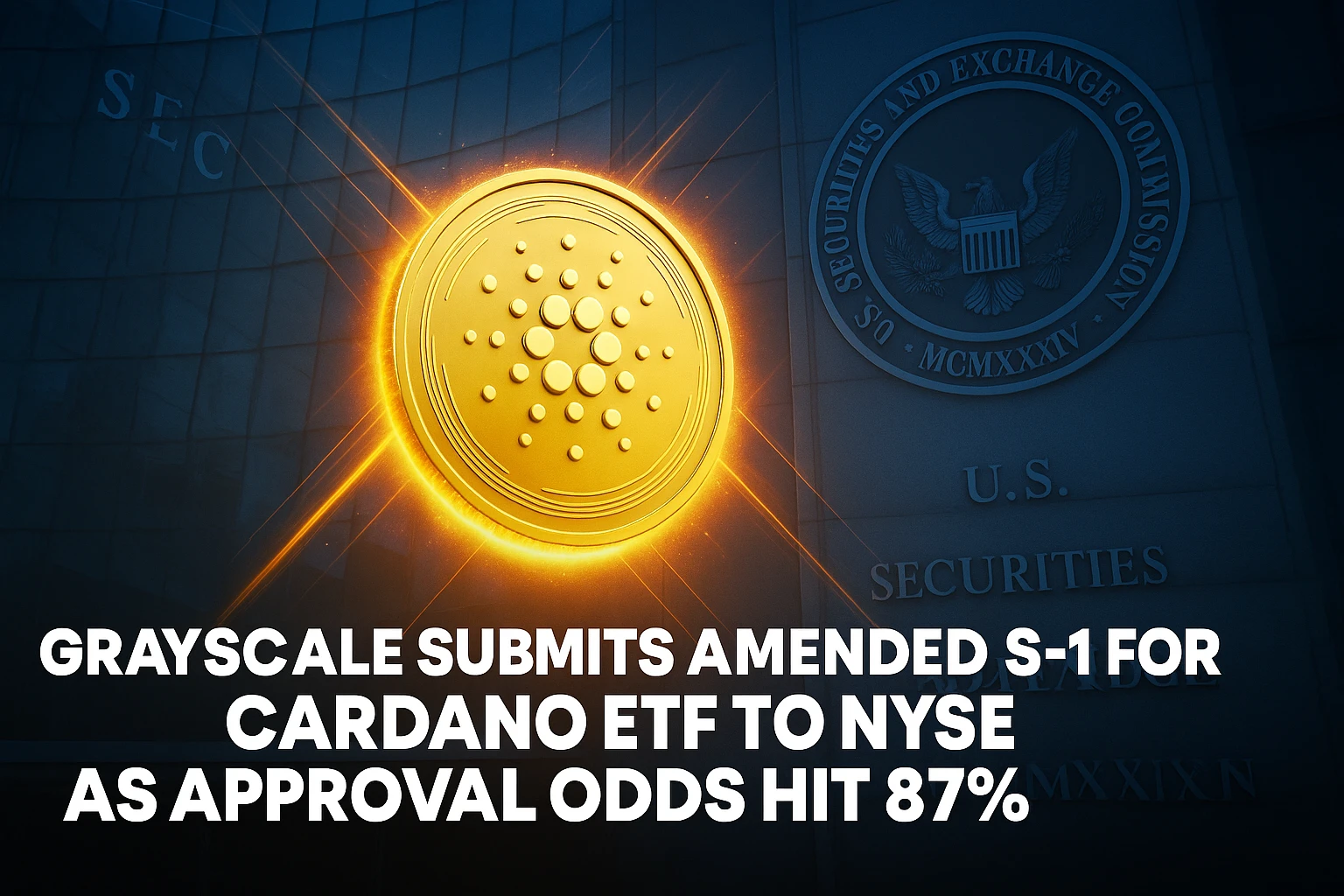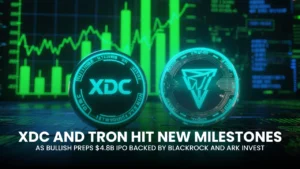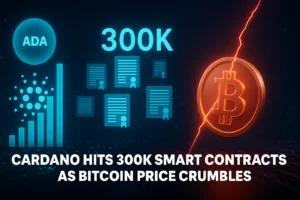Grayscale Submits Amended S-1 For Cardano ETF To NYSE Arca As Approval Odds Hit 87%

Grayscale Investments has escalated its campaign to expand crypto’s presence in traditional finance, filing an amended S-1 registration statement with the Securities and Exchange Commission (SEC) on August 29, 2025, for a Cardano Trust ETF.
- The Filing: Cardano ETF (GADA) Advances Toward SEC Decision
- Approval Odds and Market Confidence Rise
- Market Impact and Technical Context
- Regulatory Backdrop
- Competitive Landscape: Beyond Bitcoin and Ethereum
- Industry Reaction on Twitter
- Future Outlook and Industry Impact
- Conclusion
- Frequently Asked Questions About Grayscale’s Cardano ETF
- What is the Grayscale Cardano ETF (GADA)?
- What is the ticker symbol?
- Who will custody the ADA assets?
- How does staking work in the ETF?
- What is the approval timeline?
- What are approval odds?
- How has ADA’s price reacted?
- What are the risks?
- How does this compare to Bitcoin ETFs?
- Why is this ETF significant?
- Glossary of Key Terms
The proposed product, slated to trade under the ticker GADA on NYSE Arca, is designed not only to track ADA’s price but also to capture staking rewards through Cardano’s Delegated Proof of Stake (DPoS) consensus mechanism.
This marks the first time a U.S. spot crypto ETF has embedded protocol-level yield into its structure. With Polymarket approval odds at 87 % and institutional demand for regulated altcoin exposure rising, the filing could reshape how blockchain networks like Cardano are integrated into mainstream portfolios.
ALSO READ: Tron Cuts Fees by 60% to Spur Usage, Generates $58M in August Revenues
The Filing: Cardano ETF (GADA) Advances Toward SEC Decision
The Grayscale Cardano Trust ETF will be structured as a Delaware Statutory Trust, incorporated on August 12, 2025. It will hold ADA directly and track the CoinDesk Cardano Price Index (ADX). Coinbase Custody will safeguard assets, providing the institutional security that regulators require.
The S-1 outlines a critical differentiator: staking integration. ADA tokens in the trust may be staked under its Delegated Proof of Stake (DPoS) model. Staking rewards, referred to as “Staking Consideration”, would be distributed to ETF investors after expenses. In practice, this gives shareholders two forms of exposure: ADA’s market price and yield from its consensus mechanism.
The SEC has extended its decision deadline to October 26, 2025, leaving markets in anticipation. For the Trust, the dual submission of both an S-1 and 19b-4 shows a deliberate strategy to overcome procedural hurdles that delayed earlier altcoin ETF attempts.
Approval Odds and Market Confidence Rise
Prediction markets reflect surging confidence in approval. Polymarket contracts now assign an 87 % probability that the SEC will greenlight the Cardano ETF, up from 75 % one week earlier. Traders and analysts interpret the jump as evidence that investors see GADA as fitting within the regulatory framework established by Bitcoin and Ethereum ETFs earlier in the year.
A prominent Cardano community account, Cardanians_io, emphasized the development on X:
JUST IN: 🇺🇸 Grayscale has submitted an S-1 filing to the SEC for a Cardano $ADA Trust ETF 🚨
The S-1 is the official registration that explains how the Cardano ETF would work.
With both filings in, Grayscale seems prepared and likely counting on SEC approval. pic.twitter.com/NfV3HHD9YF
— Cardanians (CRDN) (@Cardanians_io) August 30, 2025
Despite optimism, ADA slipped by nearly 2 percent to $0.81 in the hours after the filing, reflecting broader market caution. Analysts note that any approval could trigger inflows sufficient to offset near-term weakness, with staking integration making GADA especially attractive for yield-conscious institutions.
Market Impact and Technical Context
ADA is currently the 10th-largest cryptocurrency, with a market capitalization around $29.8 billion. Daily trading volume averages between $350 million and $450 million, providing sufficient liquidity to support ETF operations.
ALSO READ: 21Shares Files For SEI ETF with Staking Option as SEC Considers Altcoin Approvals
Technical analysts point to ADA’s descending wedge pattern with support in the $0.75–$0.85 range. A breakout could propel the token toward $1.32 to $1.80, representing a potential upside of 120 percent. While these patterns remain speculative, the introduction of an ETF with staking rewards could provide the fundamental catalyst to validate bullish projections.
| Metric | Value / Comment |
| Filing Date | August 29, 2025 (S-1 submission) |
| Fund Name & Ticker | Grayscale Cardano Trust ETF (GADA) |
| Listing Exchange | NYSE Arca |
| Custody | Coinbase Custody |
| Benchmark Index | CoinDesk Cardano Price Index (ADX) |
| Structure | Passive; no leverage or derivatives |
| Staking Integration | DPoS-based staking, yields distributed as “Staking Consideration” |
| Incorporation Date | August 12, 2025 (Delaware Statutory Trust) |
| SEC Decision Deadline | October 26, 2025 |
| Approval Odds (Polymarket) | ~87 percent |
| Current ADA Price | $0.81–$0.83, down ~1.9 percent post-filing |
Regulatory Backdrop
The SEC has approved spot Bitcoin ETFs and moved cautiously on Ethereum products, but altcoins like ADA remain uncharted territory. Grayscale’s filing is carefully structured to address concerns: direct custody, transparent tracking, and no leverage.
Still, legal risks persist. The S-1 warns that if ADA were deemed a security under U.S. law, the trust could face termination. This uncertainty underscores why Cardano’s ETF represents a more complex regulatory test than Bitcoin’s.
Globally, regulators are also moving. The European Union’s Markets in Crypto-Assets (MiCA) framework mandates reserve and disclosure rules, while the U.S. GENIUS Act clarifies stablecoin treatment. Altcoin ETFs like GADA are likely to test how these evolving frameworks reconcile innovation with investor protection.
Competitive Landscape: Beyond Bitcoin and Ethereum
Until now, regulated exposure has centered on Bitcoin and Ethereum. The trust’s push into Cardano, and in parallel, Polkadot, signals that the ETF race is broadening.
Polkadot’s filing mirrors ADA’s structure, with staking integration and a passive framework. However, ADA’s Delegated Proof of Stake design and larger market capitalization give GADA greater visibility. By embedding staking rewards, GADA offers something neither Bitcoin nor Ethereum ETFs provide: exposure to consensus-level yield.
For institutional investors, this represents a novel diversification tool, combining the regulatory security of an ETF with blockchain-native income streams.
Industry Reaction on Twitter
The Cardano ETF filing has stirred strong reactions across the crypto community.
James Seyffart (@JSeyff), a noted ETF analyst at Bloomberg, highlights the procedural updates in Grayscale’s filings:
New: @Grayscale submits S-1s for both their Cardano and Polkadot ETFs. They had already submitted 19b-4s for each of these — so these aren’t brand new filings pic.twitter.com/JtcVBiKU2T
— James Seyffart (@JSeyff) August 29, 2025
Coin Bureau (@coinbureau), a leading crypto education and insights platform, frames the tweet with bullish enthusiasm:
🚀GRAYSCALE GOES BULLISH ON $ADA!
$60B asset manager Grayscale just filed with the SEC for Cardano (ADA) and Polkadot (DOT) ETFs.
Altcoin ETFs are heating up🔥 pic.twitter.com/03xJCXxeQO
— Coin Bureau (@coinbureau) August 30, 2025
These reactions highlight a mix of optimism and recognition of the ETF’s innovative yield-bearing design.
Future Outlook and Industry Impact
If the SEC approves GADA, the decision would mark the first recognition of Delegated Proof of Stake as a feature in a U.S.-regulated product. The implications extend beyond Cardano:
- Institutional Investors: For the first time, pensions, endowments, and asset managers could access DPoS staking rewards through a regulated ETF structure.
- Altcoin Precedent: Other DPoS networks—such as Solana, Avalanche, and Tezos—could pursue similar ETFs, broadening the market far beyond Bitcoin and Ethereum.
- Market Dynamics: Inflows into GADA could reduce ADA’s circulating supply through staking, supporting price stability while deepening liquidity.
- Global Finance: U.S. approval would pressure other jurisdictions, particularly Europe under MiCA, to accelerate similar products.
Some analysts argue this could catalyze an “ETF era for altcoins,” shifting the balance of crypto investment from speculative retail flows to regulated institutional channels.
ALSO READ: ARK Invest’s Stake in BitMine Surges Beyond $300M as Ether Treasury Model Gains Traction
Conclusion
Grayscale’s filing for the Cardano ETF (GADA) is more than just another crypto product application. By integrating Delegated Proof of Stake (DPoS) staking yields into a regulated ETF, the trust redefines how altcoins can be packaged for institutional investors. With approval odds at 87 percent and a looming October 26, 2025, SEC deadline, GADA could mark the turning point when yield-bearing consensus models enter mainstream finance.
If approved, ADA will not just be listed on Wall Street; it will carry its DPoS mechanics into the heart of institutional portfolios, setting a precedent for how blockchain networks and traditional finance converge.
Frequently Asked Questions About Grayscale’s Cardano ETF
What is the Grayscale Cardano ETF (GADA)?
It is a proposed exchange-traded fund that directly holds ADA, tracks the CoinDesk Cardano Price Index, and distributes staking rewards from Cardano’s Delegated Proof of Stake mechanism.
What is the ticker symbol?
The ETF is proposed to trade on NYSE Arca under the ticker GADA.
Who will custody the ADA assets?
Coinbase Custody will safeguard the underlying ADA.
How does staking work in the ETF?
Grayscale may stake ADA through Delegated Proof of Stake (DPoS) validators. Rewards, net of expenses, will be distributed to investors.
What is the approval timeline?
The SEC is expected to issue a decision by October 26, 2025.
What are approval odds?
Polymarket currently estimates an 87 percent chance of approval.
How has ADA’s price reacted?
ADA trades around $0.81, down slightly after the filing, but analysts expect ETF approval could boost demand.
What are the risks?
Risks include ADA being classified as a security, staking complications, tax treatment of rewards, and overall crypto market volatility.
How does this compare to Bitcoin ETFs?
Unlike Bitcoin ETFs, GADA integrates DPoS staking rewards, offering both price and yield exposure.
Why is this ETF significant?
It would be the first U.S. ETF to incorporate Delegated Proof of Stake, setting a precedent for altcoins with staking models.
Glossary of Key Terms
- ETF (Exchange-Traded Fund): A security traded on stock exchanges that tracks an index or asset.
- S-1 Registration Statement: SEC filing required to register securities for public sale.
- 19b-4 Filing: SEC form required for exchange rule changes, including new listings.
- Delaware Statutory Trust: A legal entity often used for ETFs.
- CoinDesk Cardano Price Index (ADX): Benchmark index for ADA pricing.
- Passive Fund: An ETF that tracks an asset without active management.
- Delegated Proof of Stake (DPoS): Consensus mechanism where token holders delegate validation rights to nodes.
- Staking Consideration: Rewards earned from staking ADA in the ETF.
- Coinbase Custody: Institutional-grade crypto custody provider.
- Approval Odds (Polymarket): Market-based forecast of SEC approval probability.




